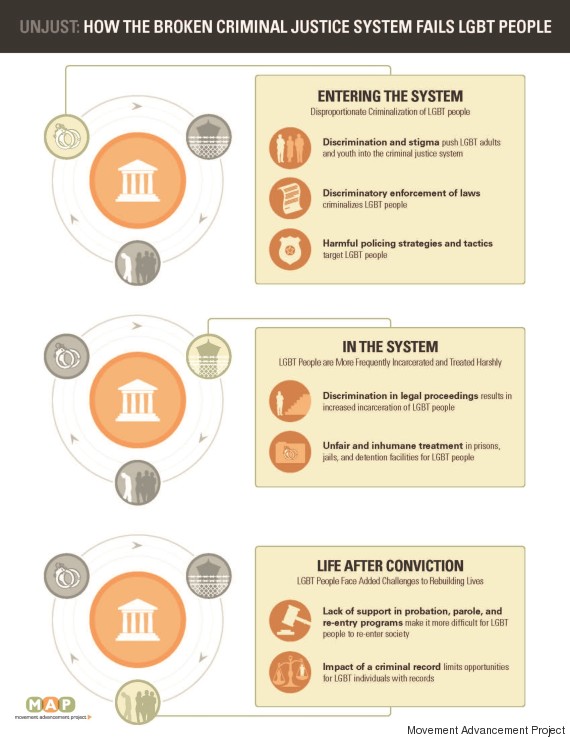Lesbian, gay, bisexual and transgender people are disproportionately jailed in federal and state prisons, according to a Movement Advancement Project report released this week.
LGBT people in the U.S. are also more likely to face discriminatory policing, be treated unfairly while incarcerated and have greater barriers to re-entering society post-release, the report found.
The analysis found that LGBT people account for 7.9 percent of the population in state and federal prisons -- although just 3.4 percent of Americans identify as gay or transgender. And while incarceration rates varied greatly for youth, MAP found that between 12 and 20 percent of people in juvenile detention facilities identify as LGBT, versus 7 percent of young people nationally.
"It used to be a crime to be LGBT in the United States, and while police are no longer raiding gay bars, LGBT people, especially LGBT people of color, are still disproportionately pushed into the criminal justice system," MAP executive director Ineke Mushovic said in a statement. "They are treated unfairly within the system and in correctional settings, and face extraordinary challenges in rebuilding their lives."
MAP's report details how LGBT Americans face discrimination at every level of the criminal justice system.
LGBT people are more likely to live in poverty, face employment and housing discrimination, lack family support and not have sufficient access to social services, MAP reports. These factors put them at a higher risk of becoming homeless or turning to criminal activity to provide for themselves or their families, thus making it more likely they will face criminal charges.
The report also found that LGBT people are discriminated against once in jail. They are more likely than other inmates to face inhumane treatment, be placed in solitary confinement and have insufficient access to legal resources. It's also more common that they'll find themselves in a courtroom with biased judges or juries.
LGBT individuals also face more hurdles once they have served their sentences and are participating in post-release procedures, including probation and re-entry programs. Additionally, a criminal record "compounds daily discrimination to create substantial barriers to rebuilding one's life," the study argues.
Earlier studies have reached similar conclusions.
A 2014 report from the Center for American Progress and Columbia University also highlighted the disproportionate incarceration rate for LGBT people. It found that 75 percent of all LGBT people or individuals diagnosed with HIV had had "face-to face contact" with law enforcement over the previous five years.
And last year, the National Center for Transgender Equality and the National Gay and Lesbian task force found that 16 percent of transgender people surveyed and 47 percent of black transgender people surveyed had spent time behind bars.
As politicians on both sides of the aisle highlight the need for criminal justice reform, MAP's researchers are urging lawmakers to consider the LGBT population while crafting policy proposals.
"As the American people and their elected leaders continue to discuss these issues, it is crucial to consider the experiences of LGBT people before, during and after their encounters with the criminal justice system," the MAP report concludes. "'Fixing' America's criminal justice system means fixing it for everybody, including nine million LGBT people across the nation."


